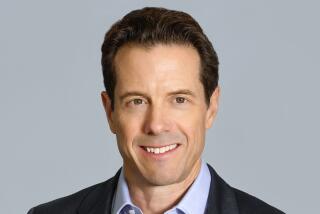COMPANY TOWN : Disney’s Litvack Tops List of Unknown but Influential Executives
Sanford M. Litvack’s name is nowhere to be found among the stars, agents and moguls who make up the annual lists of Hollywood’s most powerful.
But if anyone bothered to compile a list of the most influential people in the entertainment industry who are virtually unknown, Walt Disney Co.’s only senior executive vice president would be at or near the top.
Litvack has quietly assumed the lion’s share of responsibilities of Disney President Frank G. Wells, who was killed in a helicopter crash last April. His ascent went virtually unnoticed, however, because it came as Chairman Michael D. Eisner and former studio chief Jeffrey Katzenberg waged an extraordinarily open battle over Katzenberg’s desire for the job.
With Katzenberg’s departure, insiders say Litvack has emerged as something of a de facto second in command to the charismatic Eisner.
“He’s actually becoming quite indispensable and has taken on a lot of the things Frank did. He’s frankly taken a tremendous burden off of me,” said Eisner, who also depended heavily on Litvack while recuperating from quadruple bypass surgery this summer.
*
Eisner stressed that Litvack is one of several executives to whom he has given increasing responsibilities in the wake of Wells’ death and Katzenberg’s departure. But he added that Litvack makes his personal “dream team,” a not-so-subtle dig at Katzenberg’s use of the phrase at a splashy news conference this month to describe his collaboration with director Steven Spielberg and entertainment mogul David Geffen in a new studio venture.
Litvack also has strong support among Disney board members. Director Irwin E. Russell said he has actively urged Eisner to give Litvack more responsibility since Wells’ death.
Added director Ray Watson: “He doesn’t have the power that comes with being president and reporting directly to the board (as Wells did). But he has the trust of the chief executive officer and the board of directors.”
Litvack’s low-key style has contributed to his anonymity. The executive, who goes by the nickname of Sandy and who once worked as the federal government’s chief trust buster, admits that he doesn’t know many people in the entertainment industry and isn’t active on the Hollywood social circuit. “I can make it down a street without having to sign an autograph,” he said.
Analysts who follow the company also know little about Litvack. Said Jeffrey Logsdon of Seidler Cos. in Los Angeles: “He’s invisible to Wall Street.”
The executive, who speaks in rapid bursts with a slight accent from his native Brooklyn, describes his role of chief of corporate operations as analogous to a chief of staff to Eisner, bringing to his attention the things he needs to know about and screening from him the less important matters.
Litvack estimates he’s taken on roughly 90% of the tasks occupying Wells’ time, a logical step since the two were usually working on them together. Among Litvack’s responsibilities now are negotiating executive contracts and helping Eisner revamp Disney’s organizational structure.
*
The 58-year-old grandfather of three, who is six years older than Eisner, agrees that moving into his new role has probably been made easier by his age and wide-ranging experience, which has helped blunt potential speculation that he is trying to position himself for the top spot someday. Disney director Stanley P. Gold adds that Litvack benefits from being “a mature fellow in an industry that from time to time has its share of childlike behavior.”
Asked if he agrees that Litvack’s age is a plus, Eisner called it irrelevant. He even asked a reporter how old Litvack is, saying he didn’t know. But he did say that Litvack “isn’t into some kind of self-aggrandizement and bowing at every opportunity.”
Litvack has increasingly taken on delicate tasks at Disney, usually overseeing negotiations with what his admirers describe as a mix of toughness and diplomacy.
“He’s bright, but combines it with a lot of street savvy and a firmness that borders on toughness,” said former U.S. Atty. Gen. Benjamin R. Civiletti, Litvack’s boss when he was assistant attorney general in charge of antitrust in the Carter Administration.
Early this year, Litvack was Disney’s point man in Europe, working out an agreement with banks there to bail out the ailing Euro Disney theme park. He and Disney Chief Financial Officer Richard Nanula slogged through three months of tense negotiations, walking away from the table at one point before a compromise was reached in March.
*
Litvack also oversees the delicate human resources area, which includes policies involving negotiations with union representatives at Disney World and Disneyland. Last March, some workers were irked by a Litvack memo saying Disney was tightening up on health benefits for retirees due to high costs.
Litvack has also been dealing with issues surrounding Katzenberg’s exit and the former studio chief’s contention that he is still owed substantial amounts in bonus payments. He declined to comment on the issue. Ironically, Litvack sued one of his former law firms--Donovan Leisure Newton & Irvine--in 1992 over deferred payments he claimed he was owed in a dispute that has since been settled.
Litvack has risen quickly since Eisner and Wells lured him away from private practice just three years ago to become the company’s general counsel. He joined with the understanding that his duties would eventually expand beyond legal work.
One of the first tasks by Litvack, who handled litigation for Disney while in private practice, was to rein in legal costs. In one memo, he complained to outside lawyers about everything from photocopy charges to unnecessary parking costs. He also showed a sense of humor, attaching a sample time sheet that listed billings by partner “M. Mouse” and associate “G. Goofy.”
Litvack and Wells, who was also a lawyer, quickly became close. On Litvack’s first day on the job, the two made a pact that they were free to interrupt each other.
“He said: ‘Let’s make a deal. You can walk in anytime you want, and I’ll walk in anytime I want,’ ” Litvack said.
He recalled Wells once having to explain to an office guest that “Sandy has sneak-in privileges” when Litvack walked in on a meeting.
More to Read
The biggest entertainment stories
Get our big stories about Hollywood, film, television, music, arts, culture and more right in your inbox as soon as they publish.
You may occasionally receive promotional content from the Los Angeles Times.










